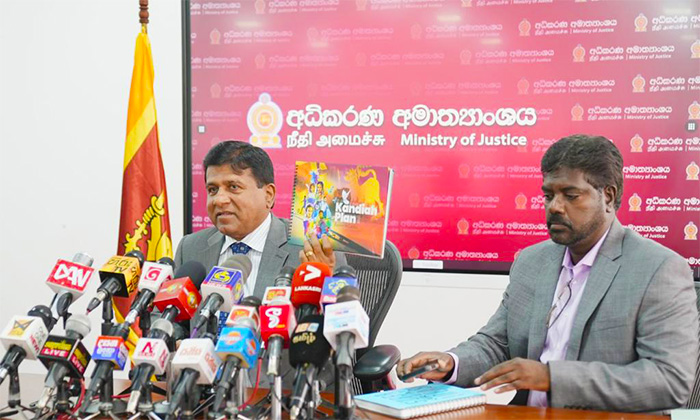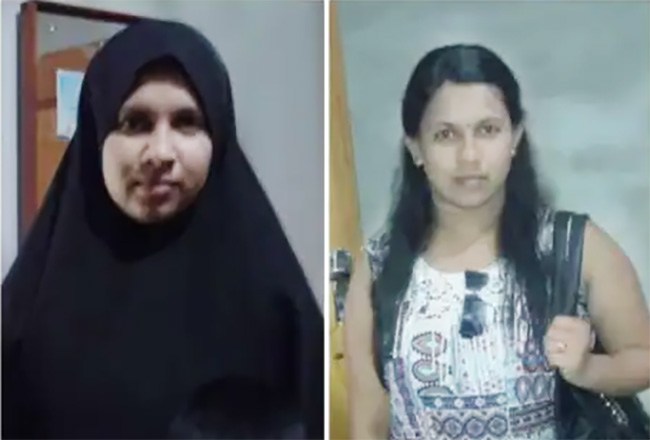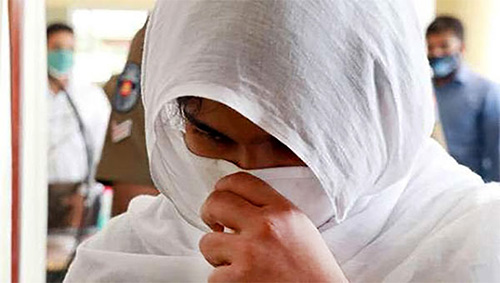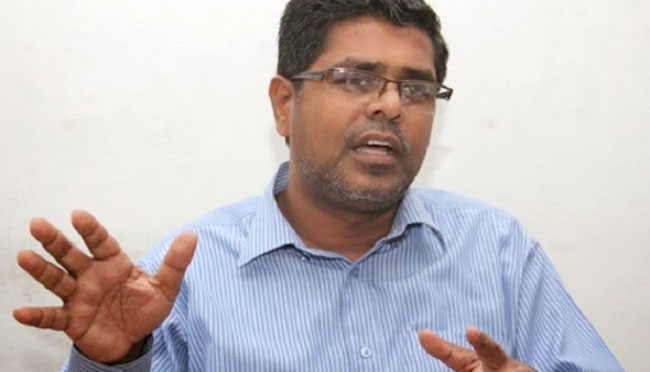SPECIAL REPORT : Part 446
By Shamindra Ferdinando
Having comfortably won the vote on the Second Reading of 2023 Budget, two days earlier, President Ranil Wickremesinghe, on November 24, dealt with a spate of issues, including the responsibilities of the armed forces and the police, obviously indicating how a second Aragalaya, aimed at ousting his government from power, by way of violent protests, as was done to the previous President, would be tackled, as the country could not possibly afford any more turmoil.
The UNP leader stressed the responsibility on the part of the government to protect the armed forces and the police, who performed their legitimate duties and responsibilities.
The Parliament approved the Cudget, on Nov. 22, with 121 voting for and 84 against, as the ruling Sri Lanka Podujana Peramuna (SLPP) reiterated its commitment to a political marriage of convenience with UNP leader Wickremesinghe whose party has only one seat in the 225-member Parliament. Wickremesinghe, in his capacity as the Finance Minister, presented the Budget, on Nov. 14.
The SLPP secured 145 seats, at the last General Election, though three breakaway groups of lawmakers have since distanced themselves from the party.
Speaking on the continuing threats faced by his government, Wickremesinghe underscored the responsibilities of all, including Field Marshal Sarath Fonseka. Perhaps, President Wickremesinghe’s reference to responsibilities of those from Corporal to Field Marshal should be examined against the backdrop of perceived relationship between the war-winning Army Commander and the Frontline Socialist Party (FSP), accused of toppling Gotabaya Rajapaksa.
Wickremesinghe talked tough and didn’t mince his words when setting the tone for the remainder of his term, secured on July 20, courtesy the SLPP. Wickremesinghe seemed confident that the balance of Gotabaya Rajapaksa’s five-year term, won with a landslide at the Nov. 16, 2019, presidential election, could be completed.
Wickremesinghe received the appointment as the Acting President, on July 13, and was elected the eighth President on July 20. As the sole UNP National List MP, Wickremesinghe polled 134 votes, including his own, whereas his rivals Dullas Alahapperuma (SLPP) and Anura Kumara Dissanayake (JVP) obtained 82 and 03 votes respectively.
Wickremesinghe delivered a clear message. The UNPer didn’t mince his words when he warned that unauthorized protests, meant to undermine his government, wouldn’t be tolerated, under any circumstances.
Wickremesinghe declared that trouble makers wouldn’t be allowed to take cover behind human rights and any attempt to adopt strategies, similar to those employed against Gotabaya Rajapaksa, would be crushed, militarily. There is absolutely no ambiguity in Wickremesinghe’s stand.
So, in case the FSP et al launched the second phase of ‘Aragalaya,’ targeting the Wickremesinghe-Rajapaksa government, they can expect the armed forces and law enforcement authorities unleashed on them.
Immediately after taking oaths, as the eighth President, Wickremesinghe directed the military to clear the Presidential Secretariat (old Parliament). Ironically, President Wickremesinghe, who was always for protests against the government in power, when in the Opposition, overnight metamorphosed into ignoring protests by the NGO-led mafia against the deployment of the armed forces. It would be pertinent to mention that President Gotabaya Rajapaksa gave in to US pressure not to use the armed forces to evict those camping outside the Presidential Secretariat until it was too late.
Even on May 09 when a well-orchestrated wave of physical attacks, and torching of properties of government politicians, was unleashed across the country, as if in spontaneous response from the public at large, over the attack on the Galle Face protesters, the same evening the US Ambassador Julie Chung issued a statement, through the local media, warning the armed forces and the police not to crackdown on peaceful protesters. We all saw how peaceful these foreign-funded protesters were when the opportunity arose. On May 09, they even turned on a group of SJB MPs, led by Opposition Leader Sajith Premadasa, when they visited the Galle Face protest site. Luckily for them, they beat a hasty retreat, with their security, sensing what was in store for them, after getting a few knocks.
During the campaign against Gotabaya Rajapaksa that commenced with violent protests outside his private residence, at Pangiriwatte, Mirihana, on March 31, SLPP lawmaker Rear Admiral (ret.) Sarath Weerasekera told this writer, on a number of occasions, the danger of failing on the part of the then administration to deal with the growing threat efficiently. Weerasekera was one of the few who demanded tangible action against the protest campaign. By July 09, protesters forced Gotabaya Rajapaksa to flee Janadhipathi Mandiraya by sea. Field Marshal Fonseka, MP, had been the only parliamentarian to address the protesters, near Janadhipathi Mandiraya, just a few hours before they forced their way into the presidential abode.
No one bothered to remind the Field Marshal of his obligations at that time. In addition to Sajith Premadasa, Fonseka, too, received an invitation from Gotabaya Rajapaksa to accept the premiership. Both declined for different reasons.
But, on the part of Wickremesinghe, there hadn’t been any wavering, as in the case of Premadasa, despite being the Leader of the Opposition. The UNP leader simply grabbed the opportunity and proceeded step by step, having evicted those occupying the Presidential Secretariat.
Lawmaker Weerasekera, who sided with President Wickremesinghe at the Budget vote, told The Island the UNP leader had dealt appropriately with those trying to undermine law and order. Unfortunately, Gotabaya Rajapaksa, despite being a distinguished former frontline combat officer, hesitated to meet the protesters’ violent challenge due to well hatched Western propaganda against his government, the MP asserted.
Prez steps up pressure on Opp. Leader
President Wickremesinghe used the opportunity to remind the House of the correspondence between his predecessor Gotabaya Rajapaksa and Sajith Premadasa in the run-up to him being sworn in as the Premier on May 12. During his Nov. 24 address to Parliament, the UNP leader tabled in House Sajith Premadasa’s letter, dated May 12, to President Gotabaya Rajapaksa.
Wickremesinghe, engaged in a desperate bid to consolidate his position, faulted the former UNP Deputy Leader Sajith Premadasa for Gotabaya Rajapaksa giving up the presidency. The President’s strategy seems clear. In addition to dealing with the economy, Wickremesinghe faces two primary challenges, namely rebuilding the UNP, now reduced to just one National List slot (Wajira Abeywardena), in preparation for future elections and the resolution of the national question (post-war national reconciliation)
The re-building of the UNP has to be achieved at the expense of Sajith Premadasa. There is absolutely no ambiguity in Wickremesinghe’s strategy. Wickremesinghe has no option but to relentlessly push SJB members to switch their allegiance to him. Although many believed Wickremesinghe could influence the majority of the main Opposition, the SJB, to switch sides, in the wake of his appointment as the Premier, it didn’t materialize. Of the 54-member SJB parliamentary group, Manusha Nanayakara (Minister of Labour and Foreign Employment) and Harin Fernando (Minister of Tourism and Land) deserted Sajith Premadasa when they accepted Cabinet portfolios, on May 20 from President Gotabaya Rajapaksa. The two SJB MPs, who spearheaded a high profile campaign, targeting Gotabaya Rajapaksa over the 2019 Easter Sunday carnage, had no qualms in receiving their letters of appointment from the very person.
The other SJB MP to accept state ministerial portfolios from Gotabaya Rajapaksa and Ranil Wickremesinghe, respectively, in April (Transport) and September (Tourism) was Diana Gamage, now at the centre of a simmering controversy over her allegedly being a British national. When there are probably at least half a dozen or so other dual citizen MPs in Parliament we wonder why just Diana Gamage is being targeted by so many.
President Wickremesinghe appears to be confident that some of those who had been elected on the SJB ticket, as well as some SLPPers, may accept Cabinet portfolios soon. Appointments are likely to be finalized immediately after the final vote on the Budget, scheduled to take place on Dec 08.
Wickremesinghe needs to reach a consensus with the top SLPP leadership, as regards Cabinet portfolios, as the latter wouldn’t, under any circumstances, tolerate appointments, sans its approval. However, Wickremesinghe will go out to engineer defections from the SJB. Will the UNP leader be able to influence a group large enough to cause the disintegration of Sajith Premadasa’s party, formed in early 2020, to contest the last General Election?
However, in spite of enjoying executive powers, Wickremesinghe would find it an extremely difficult task as the SJB, as a group, abhorred joining the SLPP-led government. On one hand, Wickremesinghe required the continuing support of the SLPP to sustain his government. On the other hand, Wickremesinghe’s dependence on the SLPP made him quite unpopular. The SLPP has so far refused to accept that it couldn’t absolve itself of the responsibility for the economic fallout, caused by utter mismanagement of the national economy. Had the SLPP government sought the IMF intervention, soon after the 2019 presidential election, Wickremesinghe wouldn’t have ended up as the President. The circumstances that compelled Gotabaya Rajapaksa to invite Wickremesinghe to accept the premiership underscored the seriousness of the situation the country had fallen into.
Having failed to get elected, from Colombo, at the last General Election, Wickremesinghe re-entered Parliament, in late June 2021, on its National List, at a time the national economy was rapidly deteriorating.
But, even Wickremesinghe wouldn’t have anticipated the turn of events that compelled the desperate Rajapaksas to invite him to accept the premiership, one month short of a year later. Having taken over the government, under an incomparable situation, Wickremesinghe seems to be hell-bent on pursuing his own agenda. The SLPP seems to be so far satisfied. The vote on the Second Reading of the Budget meant that the SLPP and Wickremesinghe are prepared to work together. though quite significant differences remain.
However, the SLPP has, in no uncertain terms, indicated that it didn’t bother about the mandates received at the 2019 Presidential and 2020 General Elections at which its candidate received 6.9 mn votes and the party obtained a staggering 145 seats, respectively.
Prez roadmap
SLPP National List MP Gevindu Cumaratunga, in two speeches in Parliament (delivered during the ongoing Budget debate) dealt with Wickremesinghe’s strategy. The leader of civil society group Yuthukama did it quite well. The first time entrant to Parliament discussed the issues at hand, including the alleged move to deliberately lose state control over land that may cause irrevocable consequences. At the onset of one speech, lawmaker Cumaratunga reacted somewhat angrily as some government members continued with their noisy private conversations, among themselves, as the MP dealt with contentious issues.
The MP asked whether Wickremesinghe was exploiting the current political-economic-social crisis to advance his own roadmap at the expense of the country. Cumaratunga raised the possibility of those enjoying the political power allowing further deterioration of the economy. The MP expressed fears of Wickremesinghe’s Budget causing a heavier debt burden at a time the country has suspended repayment of loans. The MP also slammed the government over the inordinate delay in amending the Exchange Control Act of 2017 to make it mandatory for importers to bring back massive amounts of funds ‘parked’ overseas, over a period of time, within a stipulated time frame.
In addition to Cumaratunga, Prof. Charitha Herath, as well as Prof. Channa Jayasumana ,made important contributions during the ongoing Budget debate. Both of them dealt with the land issue.
Herath, who earned public appreciation for his role as former COPE (Committee on Public Enterprises) Chairman dealt with a number of issues, including an ‘operation’ meant to facilitate land grabs. The first time MP alleged that the move to place state land under the purview of Divisional Secretaries was nothing but a ruse to allow land grabs.
Participating in the Second Reading debate on the 2023 Budget, Prof. Herath alleged that the move was meant to allow cronies of the ruling party to get hold of government lands. Declaring that LRC lands had been misappropriated for the political gains of successive governments, since 1977, Prof. Herath questioned the way state land were utilized. The 2023 Budget has proposed to legitimize wrong procedure, lawmaker Herath said, adding: “We summoned the LRC, two or three times before the Committee on Public Enterprises, and investigated the issues at hand. We found out that there had been many shortcomings in its land utilization process. We instructed the officials to take remedial measures. Now the 2023 Budget has proposed that these LRC lands should be placed under District Secretaries and Divisional Secretaries and allow them to decide to whom those lands should be given for the purpose of cultivating them. The proposal would prune down the powers of the Lands Minister.
“We do not approve the status quo of the LRC because every Lands Minister has placed the LRC under his or her friends who, in return, placed the lands at LRC under the mercy of the Minister. This should come to an end but not in the manner that has been envisaged by the 2023 Budget, Prof. Herath said.
Prof. Jayasumana raised the legitimacy of crucial decisions taken by Wickremesinghe as the UNP leader didn’t have a mandate to do so from the people. Addressing the Parliament, during the Committee Stage of the Defence Ministry vote, the first time MP asked whether the President could take decisions pertaining to national security and policy matters as he was only entrusted with completing the remainder of Gotabaya Rajapaksa’s term.
The Anuradhapura District MP suggested the need to seek the opinion of the Supreme Court as regards the ability of Wickremesinghe to call for a presidential election four years after the last poll. In this case the one held in Nov. 2019. Lawmaker Jayasumana declared that he would submit a private member’s proposal to enable Wickremesinghe to call for a fresh presidential poll after completion of one year in office. If consensus could be reached, a fresh presidential election could be held in July 2023, Prof. Jayasumana said, adding that if Wickremesinghe won he could implement whatever his proposals. Pointing out that as Wickremesinghe’s agenda had been rejected by the electorate in 1994, 2004 and 2019, the UNP leader could face serious public challenge unless he obtained a fresh mandate.
Declaring that Gotabaya Rajapaksa received a huge mandate at the 2019 presidential election to preserve Sri Lanka’s unitary status, Prof Jayasumana questioned the moves to even go beyond the 13th Amendment to the Constitution. The academic reminded that the Supreme Court had been divided on the 13th Amendment.
The SLPP rebel reminded that the Supreme Court bench that decided on the 13th Amendment did so by a majority of just one judge.
Sri Lanka is heading for unprecedented political upheaval as Wickremesinghe pushes ahead with his agenda amidst further deterioration of political-economic-social situation. The much-touted USD 2.9 bn in emergency aid from the IMF, spread over a period of four years, seems wholly inadequate to remedy the situation. Impending political turmoil appears to be quite threatening and may even undermine the economic recovery efforts unless the Parliament addressed the issues at hand with the dedication such situations required.

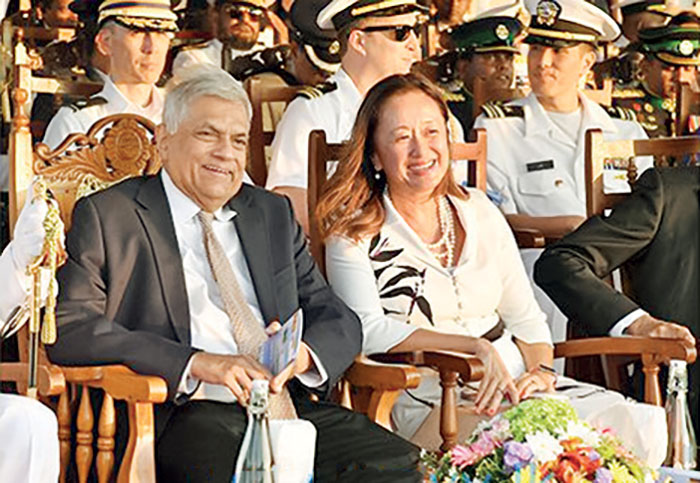
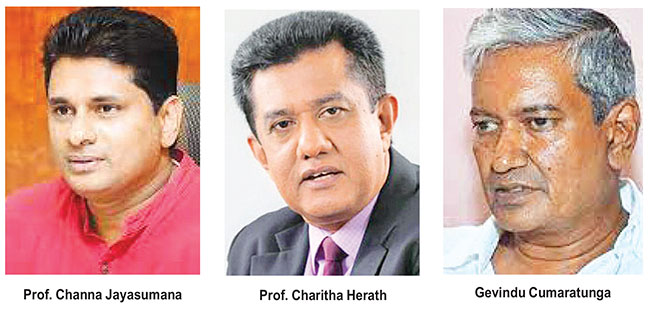 President Wickremesinghe used the opportunity to remind the House of the correspondence between his predecessor Gotabaya Rajapaksa and Sajith Premadasa in the run-up to him being sworn in as the Premier on May 12. During his Nov. 24 address to Parliament, the UNP leader tabled in House Sajith Premadasa’s letter, dated May 12, to President Gotabaya Rajapaksa.
President Wickremesinghe used the opportunity to remind the House of the correspondence between his predecessor Gotabaya Rajapaksa and Sajith Premadasa in the run-up to him being sworn in as the Premier on May 12. During his Nov. 24 address to Parliament, the UNP leader tabled in House Sajith Premadasa’s letter, dated May 12, to President Gotabaya Rajapaksa.